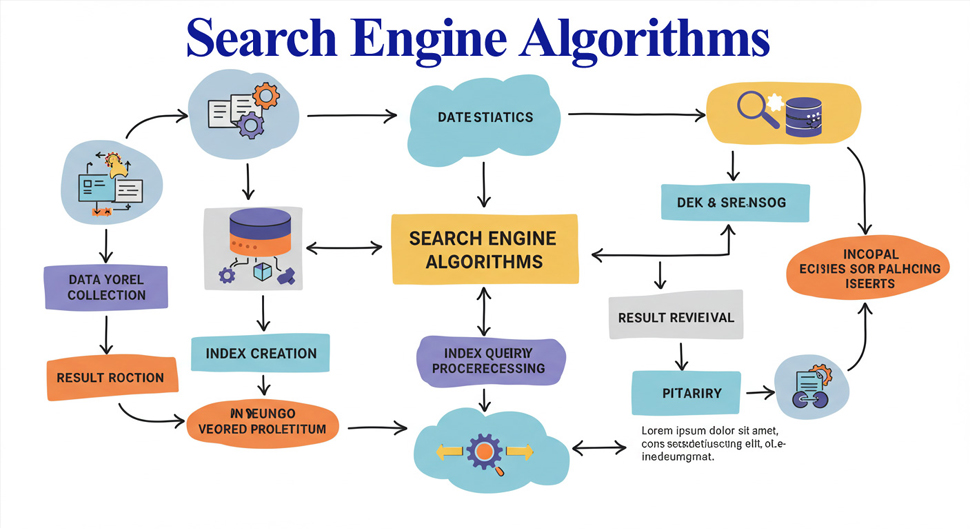Chasing the Search Engine Algorithms
Search Engine Optimization Oct 11, 2005

Search Engine Algorithms
SEOs often spend countless hours trying to ‘break” a search engine’s algorithms. “If I could just crack Google’s algorithm, my pages would soar to the top of the rankings!” Let’s look at some flaws in this way of thinking.
1. Picture the Google engineers and tech folks turning the algorithms dial as soon as you “think” you have “cracked” the algorithms. Your rankings may fall, and you would have to figure out what’s working with the engine right now. In other words, your rankings may never be long-term.
2. Instead of spending all this time trying to impress a search engine with a perfect page, why not impress your actual target audience —your customers? Has Google, BING, or Yahoo! Search ever bought anything from you? They’re not your target audience. Your customers are your target audience. Write your pages and content for them.
3. When you expend so much of your energy chasing algorithms, you often focus on only a few elements that influence ranking – those elements that are working right now and that you hope will give your pages the best chance for success. It is said that Google has over 100 ranking elements that influence ranking and relevancy. Some are more important than others. However, focusing on just one or two main components and discounting the rest can prove disastrous for a website.
A different approach.
Wouldn’t you instead achieve top rankings and keep them there, and have those rankings equate to sales and money in your back pocket? After all, isn’t it ultimately the sales you’re after, rather than just the rankings? If those rankings don’t equate to traffic, which equates to sales, you lose, anyway you look at it.
Five Basic Steps for Achieving Top Rankings without Chasing Algorithms
1. Forget about the search engines. Yes, you heard me correctly. The search engines aren’t, and never will be, your ideal target audience. They don’t buy your goods and services. They’re not who you should be trying to please with your Web pages and site. Instead, write your Web page content for your target audience.
2. Don’t ever forget the basics. No matter what’s happening in the algorithms, continue using your primary keyword phrase prominently in your title tag, META description, keyword tags, link text, body, heading tags, and so forth. That way, when the algo dial is turned, you won’t have to make changes to all of your pages. You’ll always be ready.
3. Focus your keyword-containing tags and body text on one keyword phrase only. Each page should focus on a single keyword phrase and have its own unique set of tags.
4. Write well-crafted content for your Web pages and add new content regularly. If content is king, context is queen. Focus on your keyword phrase, synonyms, related words, and the surrounding text. Use a program like Theme Master if you need help determining those supporting words.
5. Remember that both on-page and off-page factors are essential. Don’t sacrifice one for the other. On-page factors include your tags, body text, prominence, relevance, and more. Off-page factors are link popularity (quality and number of your inbound links) and link reputation (what those inbound links “say” about your Web page when they link to you).
What about search engine research? Isn’t it important? – – It’s crucial.
Let me give you an example. At the beginning of this year, pages began falling out of Google’s index. The forums were alive with speculation about what to do about it. Through research, we determined this was a compliance issue. By having compliant code, search engine spiders can crawl the content more easily. The solution? Make sure you use a DOCTYPE tag and an ISO Character Set Statement at the top of every Web page.
For example:
If you weren’t aware of the compliance issues, you could have made unnecessary changes to your web pages and wasted countless hours trying this or that, only to come up empty. Research helps ensure you stay up-to-date on what’s happening in the search engine industry. It’s what sets you apart from other SEOs. You make your decisions based on research and facts, versus speculation and theory.
In Conclusion…
“Take it from someone who has been in this business for nine years and studies the algorithms closely – don’t chase the algorithms. You say that you have a #2 ranking for a certain keyword phrase that alone is bringing your site 550 visitors per day? Great. In the time that you have spent gaining that ranking, I have written 285 pages of unique content, obtained 821 links, etc., and collectively I am getting over 1,300 visitors per day,” says Jerry West of WebMarketingNow.
In other words, by focusing on more than just chasing algorithms, you have the potential of having a much more successful website.
Post excerpts from Robin Nobles